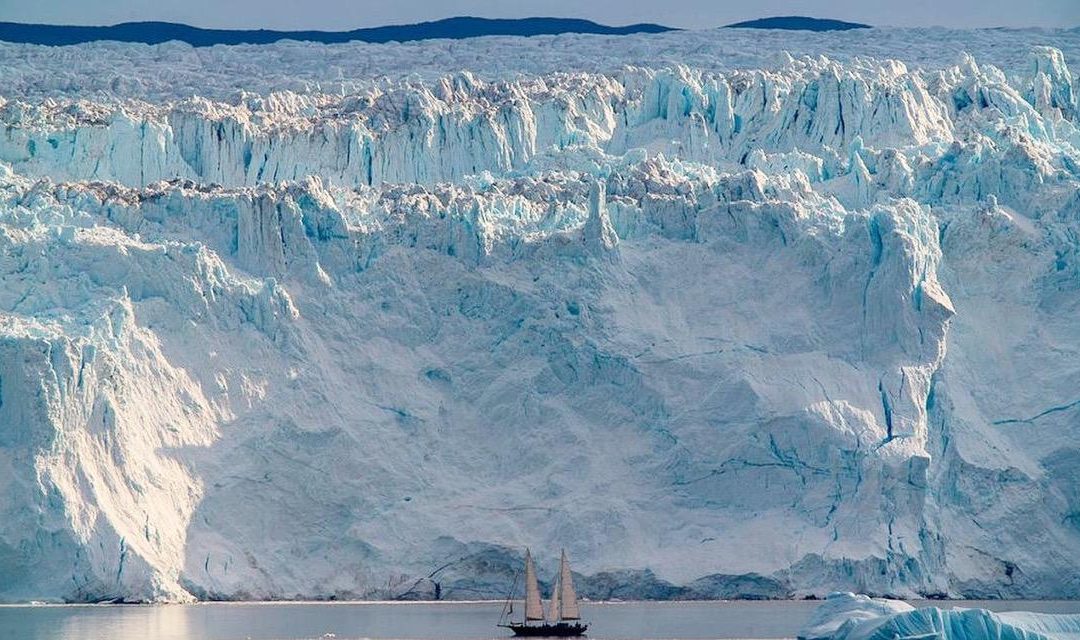Of all the movies coming out this weekend, the documentary about water probably isn’t high on your priority list. But perhaps I can convince you otherwise. Aquarela is the latest film from Viktor Kossakovsky, an acclaimed documentarian who once assembled a movie with footage that he shot from his bedroom window. Given his new, scintillating subject matter of water, you might think that Kossakovsky has a taste for elevating the mundane—but Aquarela is anything but ordinary. It’s not a documentary about water; it’s a documentary about how water is going to kill us all.
Aquarela makes that perfectly clear from the start. The film opens on Lake Baikal, a vast ice field in Russia that’s melting a few weeks earlier than usual. After watching a team of workers recover a car that fell through the ice, Kossakovsky’s camera happens to capture another vehicle as it tries to cross the lake, inevitably meeting the same fate. The workers and film crew rush to the scene of accident and save two passengers, but a third is trapped unconscious beneath the ice. We watch as two men hammer away at the frozen surface, but after too long a time, we stop holding our breaths—the third passenger has died, and we saw it happen. Suddenly Aquarela feels more like a horror movie than a documentary.
But that’s par for the course in our world of irreversible climate change. Water is coming for us not as sustenance, but as an avenging force. Aquarela never mentions climate change explicitly—there’s hardly any talking in the movie at all—but its presence is blaringly implicit. The documentary isn’t interested in proving the obvious; it assumes that the audience is aware of climate change going in, and gives us a taste of what we’re in for.
Aquarela accomplishes this through a remarkable feat of pure cinema. The film consists of wide, lingering shots of water in foreboding forms: icebergs cracking and collapsing, massive waves threatening to swallow a ship, the Category 5 hurricane that devastated Puerto Rico. The doc was transparently dangerous to shoot. But it was worth it: Kossakovsky’s cinematography is jaw-dropping, like Planet Earth for the era of the apocalypse. Aquarela captures the power and scope of an immovable object being forced to move. Earth is divine wrath through Aquarela’s lens—it giveth to the careless, and now it taketh away.
Kossakovsky shoots water in alienating ways to stress its otherworldly dominance. Oceans are shot without including the horizon as a frame of reference, rending us from the safety of a visual standpoint—are we above the water looking down, or below it looking up? Are we staring into miles of waves or wrapped up inside of one? It’s mesmerizing, and it’s drowning. Those with the privilege to watch it in a theater will gain the perspective of those already displaced by climate change.
The score, composed by the frontman of a Finnish cello-metal band, ensures that Aquarela prioritizes terror over beauty. Thrash metal plays over the sight of nature taking back its home, sonically actualizing the imminence of climate disaster. In the absence of music, Kossakovsky—who apparently had access to the world’s best microphones—accentuates the sounds of water in flux: the whipping ferocity of rain in the wind, the screams and groans of icebergs as they slowly collapse. The latter noises lose their tension after Aquarela spends an inordinate amount of time with melting ice, but everything after is auditory horror.
Human beings are framed almost entirely in long shots, emphasizing our smallness against the unstoppable force headed our way. But Kossakovsky, a master of storytelling through images, goes close-up on a person’s face just once, utilizing contrast to create the movie’s most emotional moment. A man taking shelter from a hurricane flashes someone a reassuring smile, and then stares back at the destruction around him with hardened determination. In this shot, humans aren’t so small and insignificant, and the true cost of climate change becomes overwhelmingly clear. Earth and its army of water are going to be fine—but we aren’t. Aquarela shatters the rainbow’s promise with a resounding crash.
★★★★½ (4.5/5)




